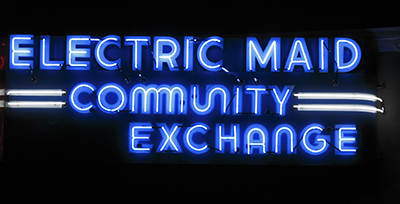
The Electric Maid holds Thursday night open mics, among other things, and tries to engage the community as much as possible.
In the cozy Takoma concert venue known as the Electric Maid, worn couches are placed around the 80-person capacity room. Art lines the walls. On its website, it’s described as a “community living room.”
Spend an hour at an open mic event at the venue and you’ll see why. The Oct. 18 lineup featured folk songwriters, a rap/funk trio, one-man a cappella and impromptu vocal solos over drum beats. One band — composed of a percussionist, a cello banjo, an Irish acoustic string instrument and a harmonica — played an award-winning children’s song they wrote about eating snakes (“The Snake Song”) that has more than 40,000 hits on YouTube.
The nonprofit venue was created in 2001 as a project of Friends of Old Takoma, a neighborhood organization designed to fight gentrification and promote local business in the Takoma area, according to Jamie Gordon, outreach and development coordinator for the Electric Maid.
Located just across the street from the Takoma Metro station, the space has featured a wide range of programs that appeal to the whole community, despite problems with funding over the years. In keeping with the goals of its parent organization, Gordon said the Electric Maid, which is entirely volunteer-run, is involved with holding community meetings and workshops for empowerment and activism.
Gordon said the volunteers try to provide as much variety as possible, both in programs and in the bands they feature in the space.
“We have some bands that are regulars here, but we actually kind of pride ourselves on the fact that we are always putting on different bands,” he said. “We can be a place for a lot of bands to get their first concert experience.”
Over the years, the Electric Maid’s involvement in the Takoma Park music scene has evolved, Gordon said. Especially at their Thursday night open mics — sponsored by the Songwriters’ Association of Washington — there is a large presence of folk singers from Takoma Park, which was once a folk music hub and still garners popular artists in that genre. Gordon said the venue previously saw plenty of Washington hardcore as well. In the future, he hopes to include more hip-hop acts.
Electric Maid has also held art shows, music workshops and clothing exchanges among other things, according to booking volunteer and open mic host Joel Pomerantz.
The biggest challenge facing the venue, which is funded through concession and ticket sales and donations from concert attendees, is earning money and widening the audience, Pomerantz said.
“The music scene, in terms of getting audience for anything, is very, very challenging,” he said. “It’s an uphill struggle.”
Gordon said part of the reason the Electric Maid doesn’t make as much money as it could is that it doesn’t sell alcohol, in an attempt to make the venue an all-ages space.
“When you go downtown to the Black Cat or someplace like that, they don’t make money on the shows; they make money on the beer,” he said.
Pomerantz said the most significant goal is to get more community input.
“We just want to [be] some place where the community can come together and see their goals brought to fruition,” he said.
Washington native Novian Haynes, 21, who performs onstage under the name Supernova, said he’s been coming to the Electric Maid since he was 14. He said he likes being involved with the venue “just to see the way the space has changed.”
“It’s got everything from go-go to drum circles,” he said.



